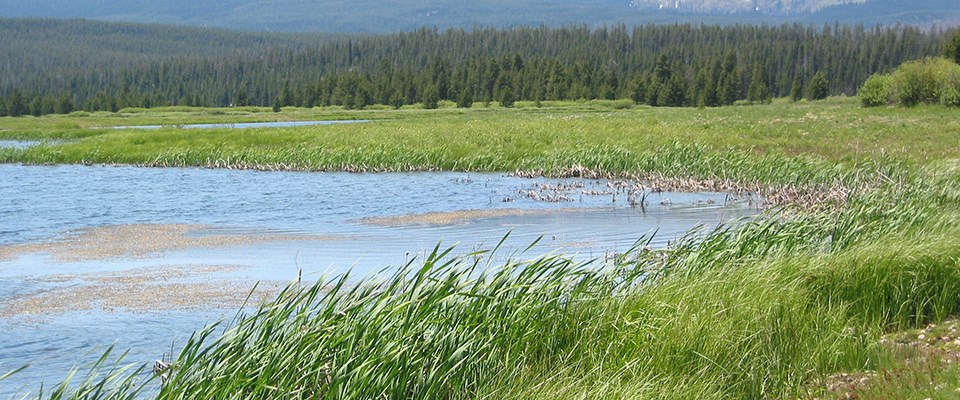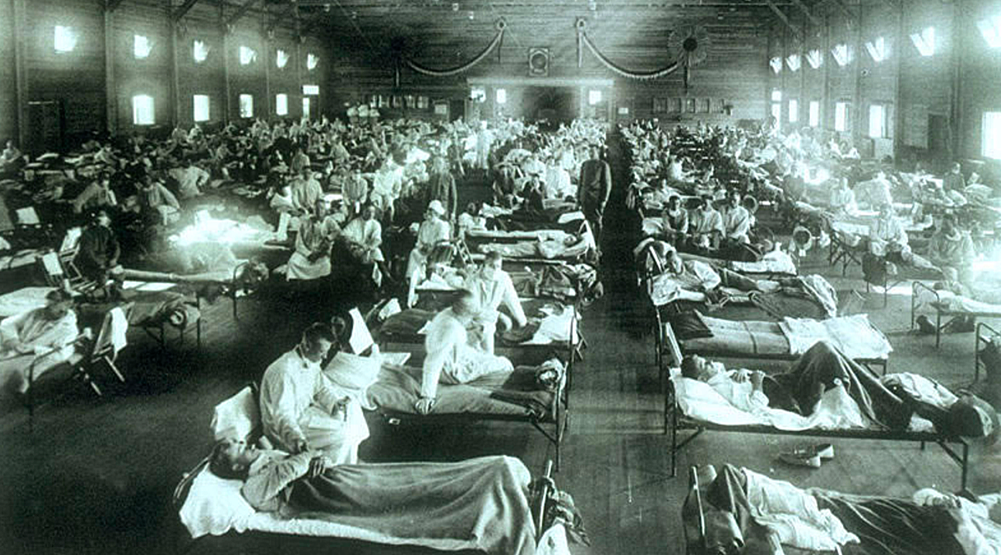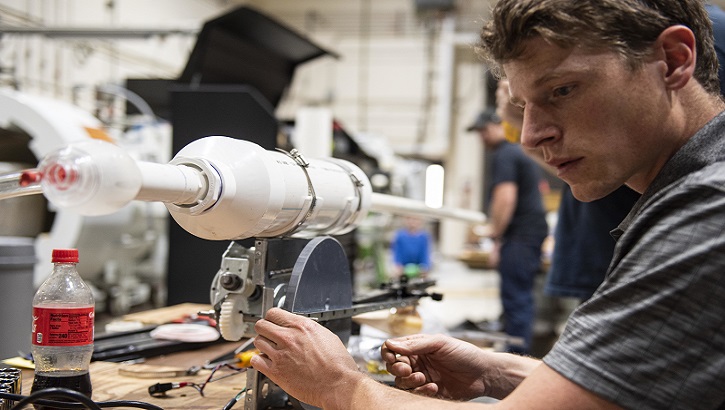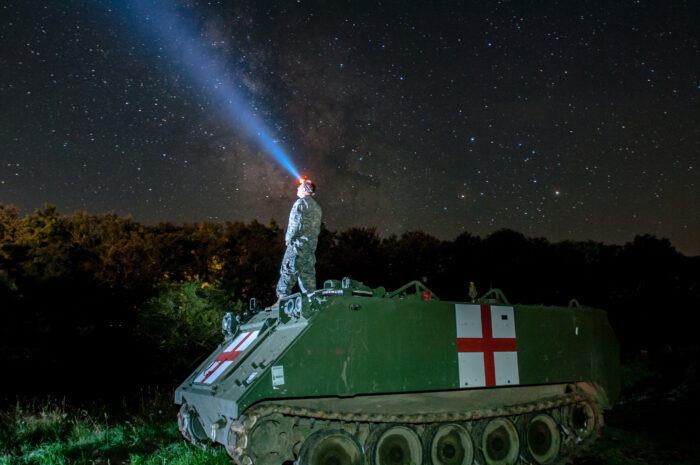William J. Astore takes this coronaviral moment as an opportunity to imagine a more democratic, less bellicose America.

An old gravel mine was restored to marsh, pond and willow habitat at John D. Rockefeller, Jr. Memorial Parkway, Wyoming. (NPS)
By William J. Astore
TomDispatch.com
 My dad was born in 1917. Somehow, he survived the Spanish Flu pandemic of 1918-1919, but an outbreak of whooping cough in 1923 claimed his baby sister, Clementina. One of my dad’s first memories was seeing his sister’s tiny white casket. Another sister was permanently marked by scarlet fever. In 1923, my dad was hit by a car and spent two weeks in a hospital with a fractured skull as well as a lacerated thumb. His immigrant parents had no medical insurance, but the driver of the car gave his father $50 toward the medical bills. The only lasting effect was the scar my father carried for the rest of his life on his right thumb.
My dad was born in 1917. Somehow, he survived the Spanish Flu pandemic of 1918-1919, but an outbreak of whooping cough in 1923 claimed his baby sister, Clementina. One of my dad’s first memories was seeing his sister’s tiny white casket. Another sister was permanently marked by scarlet fever. In 1923, my dad was hit by a car and spent two weeks in a hospital with a fractured skull as well as a lacerated thumb. His immigrant parents had no medical insurance, but the driver of the car gave his father $50 toward the medical bills. The only lasting effect was the scar my father carried for the rest of his life on his right thumb.
The year 1929 brought the Great Depression and lean times. My father’s father had left the family, so my dad, then 12, had to pitch in. He got a newspaper route, which he kept for four years, quitting high school after 10th grade so he could earn money for the family. In 1935, like millions of other young men of that era, he joined the Civilian Conservation Corps (CCC), a creation of President Franklin Delano Roosevelt’s New Deal that offered work on environmental projects of many kinds. He battled forest fires in Oregon for two years before returning to his family and factory work. In 1942, he was drafted into the Army, going back to a factory job when World War II ended. Times grew a little less lean in 1951 when he became a firefighter, after which he felt he could afford to buy a house and start a family.
I’m offering all this personal history as the context for a prediction of my dad’s that, for obvious reasons, came to my mind again recently. When I was a teenager, he liked to tell me: “I had it tough in the beginning and easy in the end. You, Willy, have had it easy in the beginning, but will likely have it tough in the end.” His prophecy stayed with me, perhaps because even then, somewhere deep down, I already suspected that my dad was right.
The COVID-19 pandemic is now grabbing the headlines, all of them, and a global recession, if not a depression, seems like a near-certainty. The stock market has been tanking and people’s lives are being disrupted in fundamental and scary ways. My dad knew the experience of losing a loved one to disease, of working hard to make ends meet during times of great scarcity, of sacrificing for the good of one’s family. Compared to him, it’s true that, so far, I’ve had an easier life as an officer in the Air Force and then a college teacher and historian. But at age 57, am I finally ready for the hard times to come? Are any of us?
And keep in mind that this is just the beginning. Climate change (recall Australia’s recent and massive wildfires) promises yet more upheavals, more chaos, more diseases. America’s wanton militarism and lying politicians promise more wars. What’s to be done to avert or at least attenuate the tough times to come, assuming my dad’s prediction is indeed now coming true? What can we do?

Emergency military hospital during influenza epidemic, January 1918, Camp Function, Kansas. (National Museum of Health and Medicine, Armed Forces Institute of Pathology, Wikimedia Commons)
It’s Time to Reimagine America
Here’s the one thing about major disruptions to normalcy: they can create opportunities for dramatic change. (Disaster capitalists know this, too, unfortunately.) President Franklin Roosevelt recognized this in the 1930s and orchestrated his New Deal to revive the economy and put Americans like my dad back to work.
In 2001, the administration of President George W. Bush and Vice President Dick Cheney capitalized on the shock-and-awe disruption of the 9/11 attacks to inflict on the world their vision of a Pax Americana, effectively a militarized imperium justified (falsely) as enabling greater freedom for all. The inherent contradiction in such a dreamscape was so absurd as to make future calamity inevitable. Recall what an aide to Secretary of Defense Donald Rumsfeld scribbled down, only hours after the attack on the Pentagon and the collapse of the Twin Towers, as his boss’s instructions (especially when it came to looking for evidence of Iraqi involvement): “Go massive — sweep it all up, things related and not.” And indeed they would do just that, with an emphasis on the “not,” including, of course, the calamitous invasion of Iraq in 2003.
To progressive-minded people thinking about this moment of crisis, what kind of opportunities might open to us when (or rather if) Donald Trump is gone from the White House? Perhaps this coronaviral moment is the perfect time to consider what it would mean for us to go truly big, but without the usual hubris or those disastrous invasions of foreign countries. To respond to COVID-19, climate change, and the staggering wealth inequities in this country that, when combined, will cause unbelievable levels of needless suffering, what’s needed is a drastic reordering of our national priorities.

Dr. Andrew Schicho, Naval Surface Warfare Center, Panama City Division mechanical engineer, led one of the five teams by building a ventilator prototype in support of the Department of Defense Hack-a-Vent Innovation Challenge. (U.S. Navy, Eddie Green)
Remember, the Fed’s first move was to inject $1.5 trillion into the stock market. (That would have been enough to forgive all current student debt.) The Trump administration has also promised to help airlines, hotels, and above all oil companies and the fracking industry, a perfect storm when it comes to trying to sustain and enrich those upholding a kleptocratic and amoral status quo.
This should be a time for a genuinely new approach, one fit for a world of rising disruption and disaster, one that would define a new, more democratic, less bellicose America. To that end, here are seven suggestions, focusing — since I’m a retired military officer — mainly on the U.S. military, a subject that continues to preoccupy me, especially since, at present, that military and the rest of the national security state swallow up roughly 60 percent of federal discretionary spending:
- If ever there was a time to reduce our massive and wasteful military spending, this is it. There was never, for example, any sense in investing up to $1.7 trillion over the next 30 years to “modernize” America’s nuclear arsenal. (Why are new weapons needed to exterminate humanity when the “old” ones still work just fine?) Hundreds of stealth fighters and bombers — it’s estimated that Lockheed Martin’s disappointing F-35 jet fighter alone will cost $1.5 trillion over its life span — do nothing to secure us from pandemics, the devastating effects of climate change, or other all-too-pressing threats. Such weaponry only emboldens a militaristic and chauvinistic foreign policy that will facilitate yet more wars and blowback problems of every sort. And speaking of wars, isn’t it finally time to end U.S. involvement in Iraq and Afghanistan? More than $6 trillion has already been wasted on those wars and, in this time of global peril, even more is being wasted on this country’s forever conflicts across the Greater Middle East and Africa. (Roughly $4 billion a month continues to be spent on Afghanistan alone, despite all the talk about “peace” there.)
- Along with ending profligate weapons programs and quagmire wars, isn’t it time for the U.S. to begin dramatically reducing its military “footprint” on this planet? Roughly 800 U.S. military bases circle the globe in a historically unprecedented fashion at a yearly cost somewhere north of $100 billion. Cutting such numbers in half over the next decade would be a more than achievable goal. Permanently cutting provocative “war games” in South Korea, Europe, and elsewhere would be no less sensible. Are North Korea and Russia truly deterred by such dramatic displays of destructive military might?
- Come to think of it, why does the U.S. need the immediate military capacity to fight two major foreign wars simultaneously, as the Pentagon continues to insist we do and plan for, in the name of “defending” our country? Here’s a radical proposal: if you add 70,000 Special Operations forces to 186,000 Marine Corps personnel, the U.S. already possesses a potent quick-strike force of roughly 250,000 troops. Now, add in the Army’s 82nd and 101st Airborne divisions and the 10th Mountain Division. What you have is more than enough military power to provide for America’s actual national security. All other Army divisions could be reduced to cadres, expandable only if our borders are directly threatened by war. Similarly, restructure the Air Force and Navy to de-emphasize the present “global strike” vision of those services, while getting rid of Donald Trump’s newest service, the Space Force, and the absurdist idea of taking war into low earth orbit. Doesn’t America already have enough war here on this small planet of ours?
- Bring back the draft, just not for military purposes. Make it part of a national service program for improving America. It’s time for a new Civilian Conservation Corps focused on fostering a Green New Deal. It’s time for a new Works Progress Administration to rebuild America’s infrastructure and reinvigorate our culture, as that organization did in the Great Depression years. It’s time to engage young people in service to this country. Tackling COVID-19 or future pandemics would be far easier if there were quickly trained medical aides who could help free doctors and nurses to focus on the more difficult cases. Tackling climate change will likely require more young men and women fighting forest fires on the west coast, as my dad did while in the CCC — and in a climate-changing world there will be no shortage of other necessary projects to save our planet. Isn’t it time America’s youth answered a call to service? Better yet, isn’t it time we offered them the opportunity to truly put America, rather than themselves, first?
- And speaking of “America First,” that eternal Trumpian catch-phrase, isn’t it time for all Americans to recognize that global pandemics and climate change make a mockery of walls and go-it-alone nationalism, not to speak of politics that divide, distract, and keep so many down? President Dwight D. Eisenhower once said that only Americans can truly hurt America, but there’s a corollary to that: only Americans can truly save America — by uniting, focusing on our common problems, and uplifting one another. To do so, it’s vitally necessary to put an end to fear-mongering (and warmongering). As President Roosevelt famously said in his first inaugural address in the depths of the Great Depression, “The only thing we have to fear is fear itself.” Fear inhibits our ability to think clearly, to cooperate fully, to change things radically as a community.
- To cite Yoda, the Jedi master, we must unlearn what we have learned. For example, America’s real heroes shouldn’t be “warriors” who kill or sports stars who throw footballs and dunk basketballs. We’re witnessing our true heroes in action right now: our doctors, nurses, and other medical personnel, together with our first responders, and those workers who stay in grocery stores, pharmacies, and the like and continue to serve us all despite the danger of contracting the coronavirus from customers. They are all selflessly resisting a threat too many of us either didn’t foresee or refused to treat seriously, most notably, of course, President Donald Trump: a pandemic that transcends borders and boundaries. But can Americans transcend the increasingly harsh and divisive borders and boundaries of our own minds? Can we come to work selflessly to save and improve the lives of others? Can we become, in a sense, lovers of humanity?
- Finally, we must extend our loveto encompass nature, our planet. For if we keep treating our lands, our waters, and our skies like a set of trash cans and garbage bins, our children and their children will inherit far harder times than the present moment, hard as it may be.

U.S. combat medic watches night sky during military exercise in Romania, 2016. (U.S. Army, Timothy Jackson)
What these seven suggestions really amount to is rejecting a militarized mindset of aggression and a corporate mindset of exploitation for one that sees humanity and this planet more holistically. Isn’t it time to regain that vision of the earth we shared collectively during the Apollo moon missions: a fragile blue sanctuary floating in the velvety darkness of space, an irreplaceable home to be cared for and respected since there’s no other place for us to go? Otherwise, I fear that my father’s prediction will come true not just for me, but for generations to come and in ways that even he couldn’t have imagined.
A retired lieutenant colonel (USAF) and professor of history, William J. Astore is a TomDispatch regular. His personal blog is “Bracing Views.”
This article is from TomDispatch.com.
The views expressed are solely those of the author and may or may not reflect those of Consortium News.
Please Donate to Consortium News.
Before commenting please read Robert Parry’s Comment Policy. Allegations unsupported by facts, gross or misleading factual errors and ad hominem attacks, and abusive or rude language toward other commenters or our writers will not be published. If your comment does not immediately appear, please be patient as it is manually reviewed. For security reasons, please refrain from inserting links in your comments, which should not be longer than 300 words.

Less bellicose America??? Keep dreaming…Violence is as American as apple pie.
This essay is the epitome of the term ‘pipe dream’. Washington is infested with people whose only, ONLY concern is the acquisition of wealth, and more wealth. The last ‘real’ president, JFK, was gunned down precisely because he wasn’t an establishment parasite. He actually wanted a better, fairer, honest America. Every single president since – including saint Obama – has been occupied solely with keeping the powerful powerful, and the rich, rich.
For any of the things that the honourable Mr Astore writes to happen, not only a sea-change in thinking would need to occur, but a complete overhaul of Washington. Congress is entirely corrupt. It would need to be replaced in it’s entirety. The military-security-industrial complex would need to be completely dismantled. Enforceable laws against corruption would need to be enacted.
None of this is remotely possible because a) the people presently in power, like being in power; however more importantly, b) American society is polarized to such a degree that absolutely no consensus can be achieved on damned near anything.
Total upheaval will be the catalyst for the things Mr Astore writes, and hopes for. But it ain’t gonna be pretty.
President Trump has in the works for some time a renewed mission to the moon and then Mars. Perhaps William J. Astore may wish to check that out. Also, the repeated criticism of the President delaying response for locking the country down: if he would have gone the other way, he would have “caught hell” for wanting to keep us home from work, etc. And then he is excoriated for accepting medical aid from Russia. How do you sleep at night?
“President Trump has in the works for some time a renewed mission to the moon and then Mars.”
So your “hope” is that once we trash our blue planet we just move on to the barren rocks of the moon and the red planet? Trump (and you and I) will be long dead and buried before that comes to fruition. Wouldn’t it make more sense to clean up and be stewards of our life-giving and life-sustaining home? The only one we know; the one to which we belong?
As the article clearly points out, it is not just about his delayed response for “locking the country down” – which in and of itself is not enough to prevent the spread of the contagion, widespread testing and then tracing the contacts of positives is also required, please read the recommendations of the WHO – but rather how he lied to the American people about the severity of the oncoming disaster and did nothing and continues to do nothing about it.
Notice those numerous red-colored words and word-phrases within the article? They are links. I suggest you click on them and read them in their entirety before spewing more nonsense.
The vast military network that slowly grew in size and sophistication throughout the world seems to be in direct proportion to high technology leaving our shoreline. This movement began in the early 1980’s and persists today. The rise in the numbers of university educated citizenry from second and third world countries were coupled with a ever increasing pool of low wage and ample numbers easily drawn from various foreign countries. In short, poorer countries now have a firm handle on lower tech production and can now manufacture what the USA distributed world wide prior to the 80’s; washing machines, cars, air conditioning units, even electrical power generation plants and so on…This truism redirected the US economy up the technological ladder to such an extreme degree that astonishing announcements began to appear in the main stream media. For example, the manufacturing sector will need 300 to 400 thousand robotics engineers over the next ten years, Yipe! We can presume that number will not be found domestically so, both industry and government will do what we always have done, import (everything) The robotic “know how” will be drawn from China, India, Iranian, Russia (oh yes!) and Pakistani’s. The imported brain trust will pick up the slack. Meanwhile how to employ citizen Joe who at best, achieved a gentleman’s “C” in some bachelor of arts program, only to end up as a certified welder. Not a bad outcome but this new predicament does beg a question, how to absorb and employ thousands of proles who will never, can never, aspire to become a robotics engineer or attain a similar level of intellectual achievement? Well, Uncle Sam decided to invest a million bucks per soldier and send them around the planet. Keep them busy by threatening where necessary, any entity interfering with the long range plans and desires of US international corporate holdings (recalcitrant individuals are remanded over to any one of our sixteen many Intel agencies for further action). Lest we forget that the other brain storm was to pack our youth into every college and university spot available. Give them loans, hopes, anything. Above all keep them off the streets. We don’t want anymore Seattle WTO protests, Woodstocks, Kent State Shootings, Chicago Seven riots, jeez! canel their loans or something… before the pitchforks come down Pennsylvania Avenue!
Yes keep em busy, to wit sending our troops to the Canadian border! God there’s just nowhere to put these young people! Well, I do hope that our soldiers arrived at the border armed only with water pistols, tho realistic looking. Point being, a Calvinistic and Christian dogmatic past clearly haunts us all. The religious upbringing is only amplified by capitalist know nothings who tout, the richer you are the more God loves you and if you don’t work you don’t eat. Sez so right here in the Good Book, Seeee!
Xi, I got a new belt and road idea for ya, convince the EU to finance the liquidation of our foreign military bases there. Converting every solder stationed there to and environmental clean up technician. We can all start with messes left over from WWI and II then proceed to more current environmental disasters. Now let me see, what would a twenty year environmental cleanup bond fetch? Got it, backed by Chinese Gold reserves and can be cashed out at four percent interest!
Civilized and educated people already reject the values of aggression and exploitation, preferring humanitarianism and preservation of our environment. The problem is that they do not know how to revise “national priorities.” That does require removal of the “lying politicians” enriching a “kleptocratic and amoral status quo” of “wanton militarism” but that cannot be done by exhortations and elections, it requires removal of control of our formerly democratic institutions by economic powers.
The suggestions of (1,2,3) greatly reduced military spending, (5) ending fear-mongering politics, and (6) replacing military & sports heroes all require removal of economic control of mass media and elections, and regulation of business to prevent the bully-boys from rising to become tyrants over democracy, who as Aristotle warned, create foreign “enemies” to pose as protectors and accuse their moral superiors of disloyalty. Bully-boys must be suppressed in all ways in all activities by all means, or they gain power and must be deposed later by bloody revolutions.
The suggestions of (4) a national service program with a CCC and WPA to promote community values in young people, and (7) extend humanitarianism to preserve its needed environment will appeal to the majority after democracy is restored.
“Civilized and educated people already reject the values of aggression and exploitation, preferring humanitarianism and preservation of our environment. The problem is that they do not know how to revise “national priorities.”
Perhaps your contentions above are predicated on the assumption/belief that “Civilised and educated people” are restricted to social relations presently self described as “The United States of America” where some seek to conflate some with all?
If so thank you for your illustration of self-absorption; a significant component in the petri dish of the opponents’ culture.
Olyapola, I was not referring to the US as “Civilized and educated” although it includes some such people, as do most nations..
Re “Sam F
April 2, 2020 at 14:25
” I was not referring to the US as “Civilized and educated” although it includes some such people, as do most nations..”
From your response it appears that you do not understand why the quote in OlyaPola
April 2, 2020 at 09:41 was :
“Civilized and educated people already reject the values of aggression and exploitation, preferring humanitarianism and preservation of our environment. The problem is that they do not know how to revise “national priorities.”.
The conflation investigated was predicated on two sentences not one; the second reading “The problem is that they do not know how to revise “national priorities” but as encouraged reflex you chose to focus on the first sentence.
The ongoing process of the transcendence of “The Soviet Union” by the Russian Federation and processes in various other locations illustrate that they do know how to revise national priorities including engaging in processes transcending the “nation state”, and that they had/have the motivation to do so.
“The problem is that they do not know how to revise “national priorities.”
The ongoing process of social relations self-described as “The United States of America” attempts to replicate and maintain themselves, illustrate to some degree that they also know how to revise “national priorities” and also have the perception that to do so could require qualitative change of the social relations self-described as “The United States of America”.
Qualitative change would defeat their replicative purpose and hence do not have the motivation to do so, unless such can be limited to linear adjustments (reform) within the frame of the social relations self-described as “The United States of America” – an attempt at revolution around a fixed point – change plus ca change – changing to remain the same, including Mr. Obama and Mr. Trump and entourages.
A fuller illumination of this process could be explored through the portals of – What is “The United States of America” and how is it facilitated?
This was also the conundrum of “The Soviet Union” from the New Economic Policy onwards, which in later mutation/presentation attempted the policies of perestroika which failed in their replicative purpose, the subsequent policies of glasnost in attempts at moderating the failures of policies of perestroika which increased the failures of the policies of perestroika, all of which facilitated the ongoing qualitative process of the transcendence of “The Soviet Union” by the Russian Federation.
“Olyapola, I was not referring to the US as “Civilized and educated” although it includes some such people, as do most nations..”
“….presently self described as “The United States of America” where some seek to conflate some with all?” (unless blame is to be attributed with likely consequence).
As outlined in various other threads nation states are generally predicated on the conflation of some with all – we are all in this togetherness – underpinned by we the people hold these truths to be self-evidentness even if practiced subliminally.
“Rethinking Our National Approach”.
This may be another illustration of the subliminal restriction to “thought experiments” in the understanding that agency resides with others.
Thank you for your cooperation in illustrating some of the components in the petri dish of the culture of the self-designated “The United States of America”.
Olyapola, those speculations about what I meant are actually incorrect: if you add “of the US” after “Civilized and educated” you will see that I was not referring to the US as a whole, nor complimenting the ruling rich, nor conflating some with all. But it is useful to have the reminder that comments should be phrased so that readers elsewhere interpret as intended, which I will try to do.